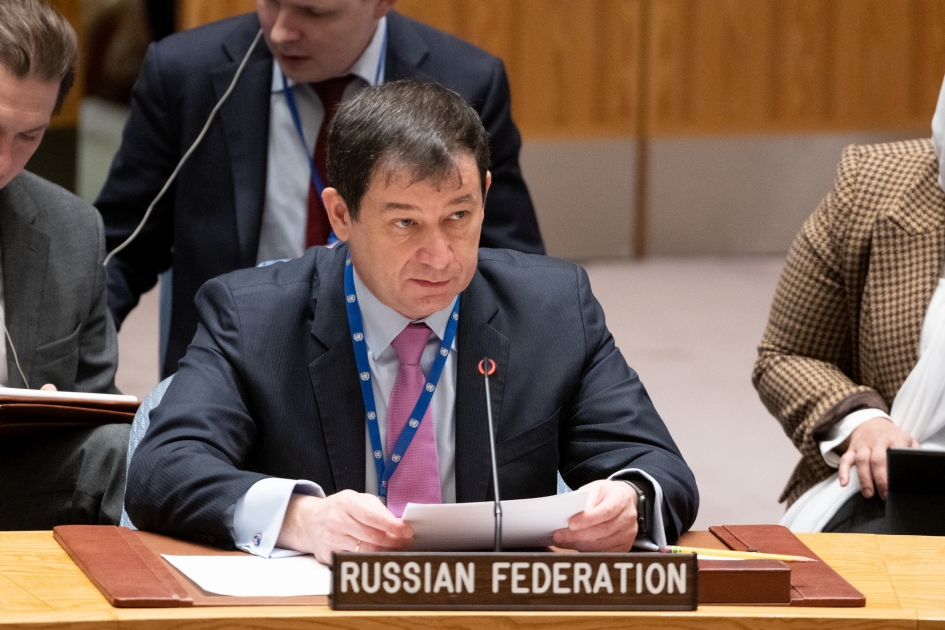Statement by First Deputy Permanent Representative Dmitry Polyanskiy at UNSC briefing on the situation in the Middle East, including the Palestinian question
Mr.President,
We thank Tor Wennesland for the briefing on the situation in the Middle East, including the situation on the occupied Palestinian territories. It is rather symbolic that our today’s discussion is taking place on the eve of the International Day of Solidarity with the Palestinian People.
Another round of escalation in the area of Palestinian-Israeli conflict confirms that the situation on the occupied Palestinian territories will remain highly explosive until the sides come up with mutually acceptable solutions on all issues relating to the final status within the international legal framework for Middle Eastern settlement, including the two-state formula.
Given relative stabilization around the Gaza Strip after Israel’s military operation in August 2022, which claimed lives of at least 49 Palestinians, including 17 children, tension in the West Bank remains rather strong. After the Israeli blockade and raids in Jenin, cleansing began in Nablus and Shu’fat refugee camp in Eastern Jerusalem. According to the incoming reports, forceful actions of Israel in the West Bank have caused 130 deaths since the start of 2022, which makes this year the deadliest since 2005.
Against the backdrop of such disproportionate use of force in the occupied Palestinian territories, irreversible “facts on the ground’ continue to be created as a result of unilateral steps, e.g. construction of settlements, expropriation of Palestinian property, demolition of housings, arbitrary arrests, violation of the status quo of Jerusalem’s Holy Sites.
Thereby Israel’s arbitrary illegitimate action reaches beyond the limits of West Bank and Gaza and affects the neighboring Arab states, whose sovereignty was violated on numerous occasions, i.a. when strikes were launched against Syria and Lebanon. We stand against such ways of upholding national security, which pose threats to other states and turn the Middle East into an arena for confrontation with Iran by proxy. At the same time, we strongly condemn attacks against civilians, which took place in Jerusalem last week.
There appears to be no prospects for reviving the peace process, which has remained frozen since 2005. The Palestinian problem is becoming a “bargaining chip” in the series of election campaigns in Israel, and it is also being driven out of the international agenda by the United States, who blocked the efforts of the Quartet of international intermediaries for the Middle East and precluded adoption of any meaningful decisions by the Security Council. Besides, as we heard today from the Special Coordinator, the Middle East settlement suffers from the fact that the US and its allies prioritize the Ukrainian crisis.
The remaining divide between Fatah and Hamas makes it possible to exploit the idea of Israel having no unified partner on the Palestinian side. In this regard, we welcome the signing of the Algiers declaration, in which framework the Palestinian factions committed to making further steps towards national unity. We believe this is an important development, which proves that Palestinians are ready to negotiate from shared positions.
Mr.President,
Despite Israel’s proclaimed intention to facilitate the improvement of the economic status of Palestinians, the overall social and humanitarian situation on the Palestinian territories continues to deteriorate. In this regard, we attach great importance to provision of humanitarian assistance to all those in need in the West Bank and Gaza, and also to the Palestinian refugees in the neighboring Arab states.
We are disappointed over the lack of proper reaction to this on the part of the UN specialized agencies, and primarily UNRWA, the work of which becomes paralyzed due to a lack of funds. The activities of UNRWA have not only a humanitarian, but also a political dimension, which is why they produce an important stabilizing effect on the Palestinian territories and in the Middle Eastern states at large. We provide our continued support to the Agency when its mandate renewal is due in the General Assembly, and reiterate our readiness to carry on with one-time voluntary contributions. Unfortunately, due to the unilateral anti-Russian sanctions, we remain deprived of the opportunity to make a financial contribution to UNRWA’s budget. Nevertheless, Russia will remain supportive of the Agency; and we call on the entire international community to follow suit.
Thank you.
